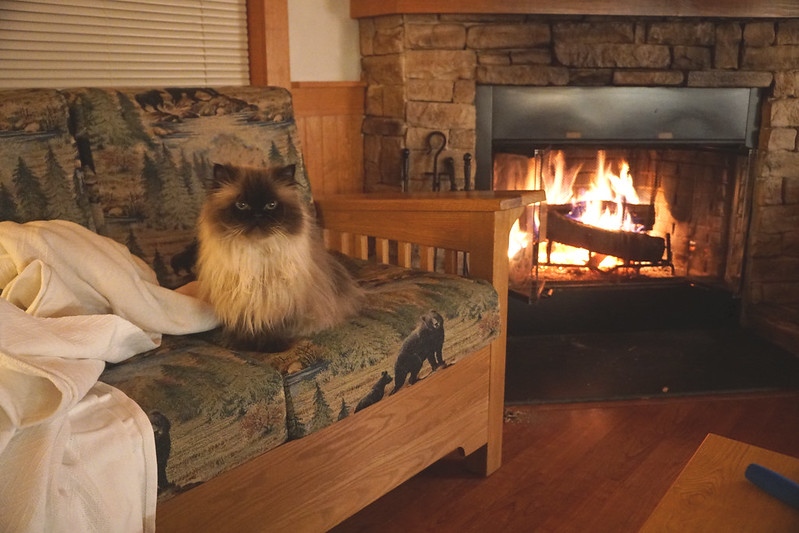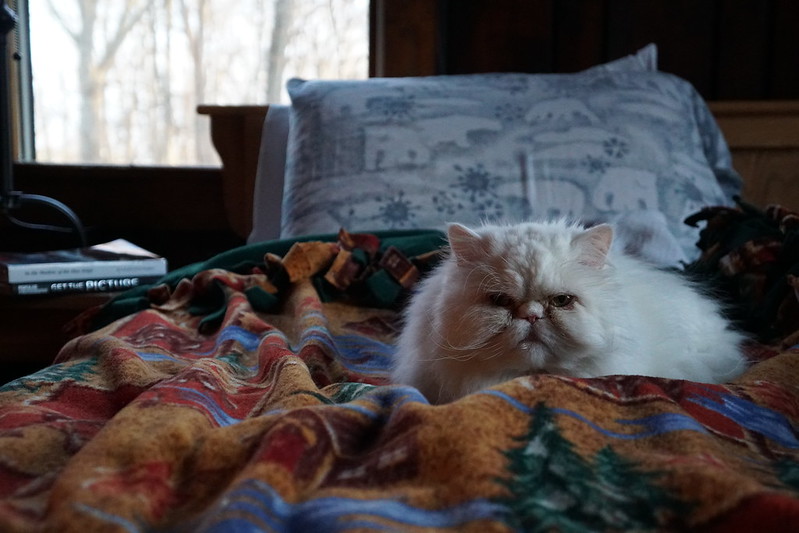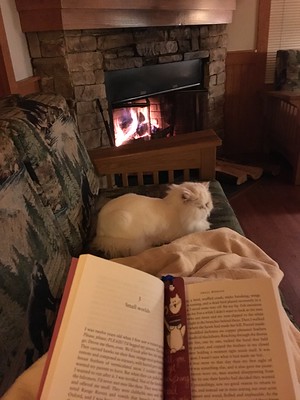Open fires are prohibited throughout the park from midnight to 4 p.m., Feb. 15 through April 30. Learn more.
Read Our Blogs
Camping with Cats
Adventuring with a furry companion has been the domain of dog owners but those of us who are owned by cats don’t need to leave our feline friends at home. The rise of internet cats traveling the globe might have you wondering how to include your cat the next time you venture out. With some consideration and planning, including your cat in your next Virginia State Park getaway might be a possibility. Cabins and campgrounds are pet-friendly!

Cabins are pet-friendly.
Read the Pet Policy before making reservations.
During one of our many stays at a Virginia State Parks cabin, my husband and I were enjoying a roaring fire when he commented that our cats would have enjoyed it too. We decided at that moment we wanted them to be a part of our adventures.
The following year, we brought our two senior kitties, Sophia and Blanche, on a long stay during the winter season. Upon arriving at our cabin, they explored their new surroundings before making themselves comfortable in front of the fireplace. They spent the rest of the stay watching birds and squirrels from the windows, sitting in our laps while we read or played games, sleeping on the beds, playing with toys and lounging around. They certainly seemed to enjoy themselves and their company enhanced our experience.

Bringing cats on a camping trip takes planning. Here are some tips to help you prepare.
1. Consider your cat’s purr-sonality. Is your cat amenable to car rides and new places? Subjecting your cat to considerable unnecessary stress is not in her best interest. If your cat is likely to cry or hide during your entire stay, it might be best to call the pet-sitter instead.
2. Be sure vaccinations are up-to-date. Talk to your veterinarian about all the necessary precautions you need to consider, especially if you plan to camp outdoors. Carry records of your cat’s vaccines and have your vet’s contact info with you.
3. Know where to find a local vet. Bring your cat’s most recent records in case they need care during your stay. Many parks can inform you of the closest veterinary hospital but it is your responsibility to plan ahead and be prepared in the event of an emergency.
4. Get tagged and chipped. Be sure your cat is fitted with a collar and tag. Consider having your cat micro-chipped and check that the information associated with the microchip is current.
5. Read the Pet Policy when making your cabin or campsite reservation via our online web reservation site. There is a small additional fee for having pets at a cabin. Learn more about camping in Virginia State Parks, or by calling 800-933-7275.
Traveling with Kitty
Cats need to be safe inside your vehicle so using a carrier or crate is a must. Carriers that can be secured in place by a seatbelt are best. Larger carriers for longer rides will make your cat more comfortable. Try to avoid feeding right before a long ride and give your cat a break to use the litter box. Keep your cat on a leash, even when she is inside the carrier so she can’t make a quick escape. Keep windows closed and radio volume low to reduce stress. Never leave your cat alone in a vehicle, especially on a hot day.

Cats should be safely secured inside a vehicle.
Allowing your cat to become acquainted with a carrier or crate before a trip reduces anxiety.
Supplies
• Food, bowls or dishes
• Treats
• Toys and scratch pads/posts
• Grooming supplies
• Harness and leash
• Litter box, litter, scoop. Disposable little trays can be purchased in some pet supply or grocery stores. Please consider the environment when disposing of the litter.
• Bedding or a place for your cat to sleep comfortably, especially if you are camping outdoors.

A Note about Cats and the Outdoors
Always keep your cat on a leash and within your sight at all times. Cats are not part of the natural environment and should not be allowed to roam freely. Cats pose a threat to wildlife because of their hunting instincts. Larger animals such as coyotes and eagles have been known to make a meal out of a cat. Please keep wildlife and your pet safe by keeping your cat on a leash.
Remember, cats do what they want. Introduce a new activity or environment slowly. Do not force your cat to engage in activities that cause them stress. Give them plenty of time to adjust and they will come around when they are ready.
You’re all set to begin your adventures with your feline companion. Camp on, kitties!

Cats can enjoy watching birds and squirrels from the windows,
cat-napping, playing with toys and lounging around by the fire.
If you have read the article and have a question, please email nancy.heltman@dcr.virginia.gov.
Search for blogs
By Park
Categories
Cabins
Camping
Fishing
History and Culture
Other
Programs and Events
Trails
Volunteers
Water Fun
Archive
2026
2025
2024
2023
2022
2021
2020
2019
2018
2017
2016
2015
2014
2012













